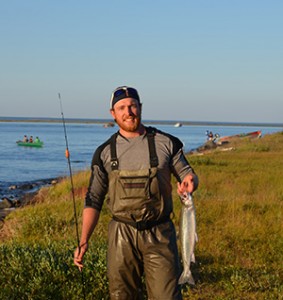 I am interested in how movement ecology and environmental physiology interact to facilitate migration in arctic fishes. My rationale for this interest is that migratory life history traits (e.g. timing, frequency and rate of migration) determine the environmental conditions that fish experience over the course of their migrations. Once a migration has begun, the environmental physiology (e.g. thermal tolerance) of the fish is a major factor in determining their ability to successfully migrate under the given water conditions. As a result, migratory life history and environmental physiology interact to influence the fitness of fish within populations. Studying these interactions in the arctic is particularly important because there is a paucity of information regarding the biology of numerous populations of culturally and ecologically valuable fish. The resulting information will be critical in predicting the ability of arctic fish to cope with the highly prevalent effects of global climate change and will therefore be useful when forming management plans for arctic fisheries.
I am interested in how movement ecology and environmental physiology interact to facilitate migration in arctic fishes. My rationale for this interest is that migratory life history traits (e.g. timing, frequency and rate of migration) determine the environmental conditions that fish experience over the course of their migrations. Once a migration has begun, the environmental physiology (e.g. thermal tolerance) of the fish is a major factor in determining their ability to successfully migrate under the given water conditions. As a result, migratory life history and environmental physiology interact to influence the fitness of fish within populations. Studying these interactions in the arctic is particularly important because there is a paucity of information regarding the biology of numerous populations of culturally and ecologically valuable fish. The resulting information will be critical in predicting the ability of arctic fish to cope with the highly prevalent effects of global climate change and will therefore be useful when forming management plans for arctic fisheries.
Current research:
I am currently studying the migratory life history and thermal physiology of the Nulahugyuk Arctic Char Run, a traditional fishery for Inuit in the West Kitikmeot region of Nunavut. This research is being carried out in collaboration with the Kugluktuk Hunters and Trappers Organization and the Edmonton office of Golder Associates Ltd. To date we have identified unique migratory strategies that help limit the exposure of char to harsh migratory conditions such as very shallow water and large temperature fluctuations. While these migratory strategies may assist char in avoiding the worst migratory conditions, my physiological research indicates that their current conditions are sufficient to induce severe heat stress and limit their ability to recovery from exercise.

